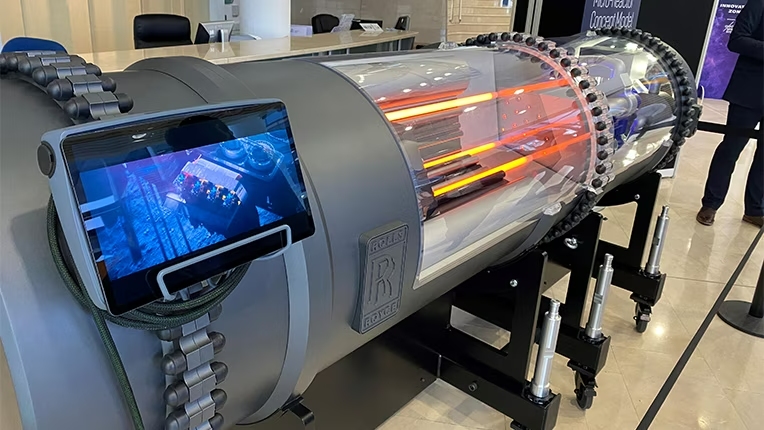UK Moon Exploration: Rolls-Royce Reveal Micro-Reactor Model
11th Dec 2023
The UK has been playing a major role in global Moon exploration efforts, and the next piece of the puzzle will come from propulsion experts Rolls-Royce. The UK firm has announced they will be delivering a ‘space micro-reactor model’.
The UK Space Agency (UKSA) pumped £2.9 million into the concept, which was unveiled at the UK Space Conference. Rolls-Royce said the reactor would be used to power a Moon base in the not-so-distant future.
Abi Clayton, Rolls-Royce’s Director of Future Programmes, commented in a statement: “This funding has enabled crucial research and development of technologies that bring us closer to making the Micro-Reactor a reality. Our Space Micro-Reactor Concept Model allows us to demonstrate how this technology will bring immense benefits for both space and Earth.”
Rolls-Royce’s ‘Space Micro-Reactor’ To Launch By 2030
Rolls-Royce are aiming to have built their space micro-reactor by early 2030 in preparation for a launch to the Moon. The initial UKSA funded the project to identify and achieve three thematic areas: heat generation, transferable heat methods, and the ability to convert the generated heat into electricity, Rolls-Royce said.
Viable power sources are a necessitated feature of any space mission. Therefore, Rolls-Royce articulated that: “a micro-reactor can provide power for the habitation and exploration of a planetary surface”, namely, the Earth’s Moon. They can also be applied to the “power and propulsion [of] spacecraft,” Rolls-Royce added.
They also recognise that the technology could enable flexible satellite mobility, which would: “protect and defend key orbits’. UKSA CEO, Dr. Paul Bates, said: “This innovative research by Rolls-Royce could lay the groundwork for powering continuous human presence on the Moon while enhancing the wider UK space sector, creating jobs and generating further investment.”
Key Features That Will Aid In-Space & On-Ground Infrastructure
To conceptualise the reactor, Rolls-Royce said they worked with many institutions including the University of Oxford and Bangor University. The micro-reactor itself is a compact and lightweight alternative to other power generation systems. In addition, it is not bound to solar power and “other environmental conditions”, Rolls-Royce said. They also noted that nuclear power is carbon friendly, “which also supports global net zero targets.” Provided the micro-reactor is successful, Rolls-Royce aims to use it to support other industries, such as defence.
The UK’s Part In Moon Exploration
Rolls-Royce is a subsection of the UK’s mission to support global interest and exploration of the Moon. Currently, Britain is assisting in a major Moon-based project: NASA’s Artemis mission. To solidify the UK’s involvement, Britain partnered with NASA through ‘The Moon Agreement’ – penned in late 2020. This collaboration will see the Lunar Gateway – a space station that will live in lunar orbit – built in the UK.
The partnership also brought UK-based organisations such as Thales Alenia Space, Goonhilly Earth Station and more into play. They will be tasked with developing key technology for the Artemis mission. In addition, UKSA funded a £169,000 Moon rock mining technology improvement project led by Thales Alenia. ESA’s Terra Novoe roadmap also outlines Europe’s ambition to touch the lunar surface by 2029; the UK will be a key partner in the plan’s success.

![Beauty of the Pink Moon And Lyrid Meteor Shower in This Week’s Best Astrophotos [19-26 April] Beauty of the Pink Moon And Lyrid Meteor Shower in This Week’s Best Astrophotos [19-26 April]](https://orbitaltoday.com/wp-content/uploads/2024/04/Pink-Moon-is-on-its-way-above-the-mountains-1-300x300.jpg)





Thank you for your comment! It will be visible on the site after moderation.